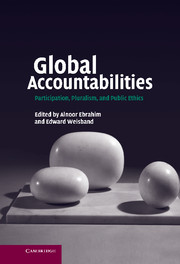Book contents
- Frontmatter
- Contents
- List of tables
- List of figures
- Acknowledgments
- List of contributors
- 1 Introduction: forging global accountabilities
- Part I Public accountability: participatory spheres from global to local
- Part II Experiments in forging NGO accountability: mutuality and context
- Part III Reflective accountability: new directions for participatory practices
- Part IV Global accountability frameworks and corporate social responsibility
- Index
Part II - Experiments in forging NGO accountability: mutuality and context
Published online by Cambridge University Press: 22 September 2009
- Frontmatter
- Contents
- List of tables
- List of figures
- Acknowledgments
- List of contributors
- 1 Introduction: forging global accountabilities
- Part I Public accountability: participatory spheres from global to local
- Part II Experiments in forging NGO accountability: mutuality and context
- Part III Reflective accountability: new directions for participatory practices
- Part IV Global accountability frameworks and corporate social responsibility
- Index
Summary
The contributions in this section focus their attention on accountability problematics among development organizations, particularly NGOs. David Brown offers a critique of existing accountability models, based in principal–agent theory and democratic representation, arguing that neither are adequate for multiparty initiatives that rely on negotiation and reciprocity among actors. He thus offers a third framing, what he calls “mutual” accountability, elaborated through two examples of civil society and private sector networks.
The workings of such accountability are also forcefully demonstrated in Ian Smillie's chapter which documents the global campaign against “blood diamonds.” Smillie was an insider in the campaign, having worked with a pioneering NGO in the conflict as well as for a UN Security Council Expert Panel to track the connection between diamonds and Sierra Leone's grisly civil war. His analysis is thus activist and applied in tone rather than theoretical, and lends further empirical weight to Brown's mutual accountability framework. It also shows, however, that for certain accountability problems such as diamond certification, mutual accountability is not enough and must be backed by regimes of monitoring and enforcement.
The final chapter in this section, by David Lewis, emphasizes the socially constructed nature of accountability, and the centrality of cultural context in grounding an analysis of it. Drawing from the experiences of a large and successful Bangladeshi NGO, Lewis explores the positioning of accountability “within wider fields of power and social networks.
- Type
- Chapter
- Information
- Global AccountabilitiesParticipation, Pluralism, and Public Ethics, pp. 87 - 88Publisher: Cambridge University PressPrint publication year: 2007
- 1
- Cited by

